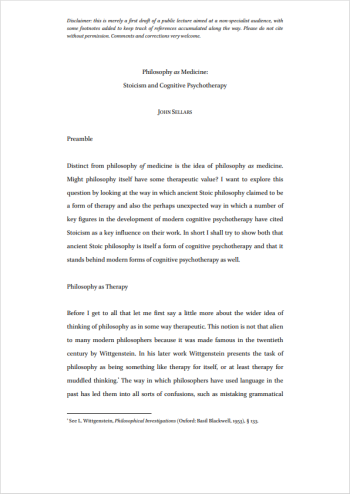 I just finished reading this (draft) article by John Sellars, “Philosophy as Medicine: Stoicism and Cognitive Psychotherapy”. It’s a good read even as a draft, and came to me at an opportune time. I don’t think this counts as a citation in his notes, but I will point you to the original publication link. He begins by touching on the history of philosophy as a therapeutic, not for philosophy itself by for our minds, souls. This is be written for a non-Stoic audience, and will probably touch much ground that we have covered here, and I would suspects all my readers have covered elsewhere.
I just finished reading this (draft) article by John Sellars, “Philosophy as Medicine: Stoicism and Cognitive Psychotherapy”. It’s a good read even as a draft, and came to me at an opportune time. I don’t think this counts as a citation in his notes, but I will point you to the original publication link. He begins by touching on the history of philosophy as a therapeutic, not for philosophy itself by for our minds, souls. This is be written for a non-Stoic audience, and will probably touch much ground that we have covered here, and I would suspects all my readers have covered elsewhere.
The core part of the article extracts three practices of Stoic therapy:
I: Assigning Value
II: Assuming the Worse
III: Good out of Bad
I won’t steal his’ thunder by going into depth here, but these must surely look familiar to the practicing Stoic as The Discipline of Assent, Premeditatio Malorum, and … well, most of Seneca. The paper is twenty-five pages long, and also briefly touches on some Epicurean doctrine. There are a few things I might take issue with at nit-picky level, but considering it’s for a non-specialized audience it’s very good. One such thing being, “The ideal Stoic life is thus not one completely devoid of emotion, but it is one free from unpleasant emotions.” This does a good job at refuting the misconception that Stoics are Vulcans, but doesn’t quite get us to “virtue is the only good.”
I would like to share one short but excellent pull quote, however (with the smallest of editorial license):
“[I]n life, it is only through apparent adversity that we get to prove our character.”
Really interesting article about how philosophy can be used as medicine, thanks for sharing. I had some knowledge of the link between Stoicism and cognitive psychotherapy but I didn’t know it was so strong. Seeing Sellars write about how Aaron T. Beck and Albert Allis explicitly cite Stoicism as a source of inspiration for developing their treatments really shows the impact that the philosophy had on them. It’s awesome to think that a philosophy that’s over two thousand years old has been rediscovered and is being used as a tool to treat people today. It just shows how valuable it is and hopefully a lot more people will become exposed to it through these sorts of articles and people like you writing and sharing some of that tasty wisdom. I think it’s especially important now with this pandemic locking people down and really testing their mental resilience. I think the stoics would see it as a good challenge and an opportunity to put their philosophy into practice! Seneca would say, “It’s not what happen to you, but how you react to it that matter”.